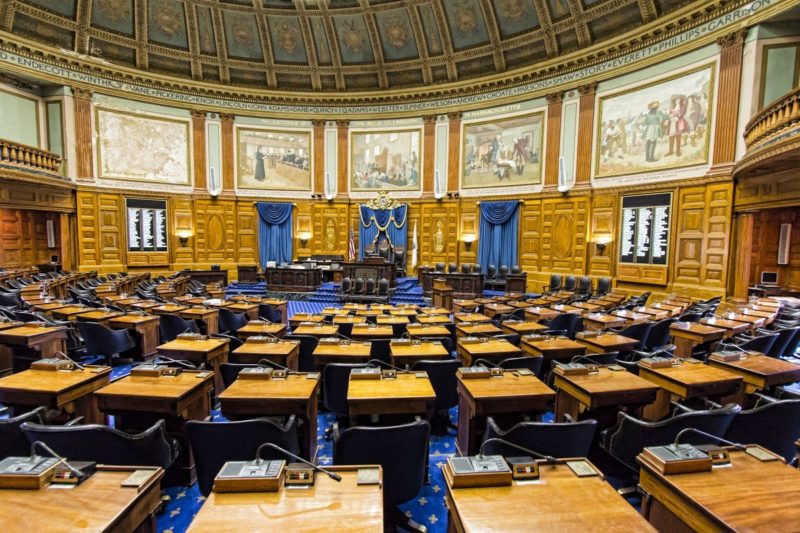Transgender Rights Notch a Legislative Win in Massachusetts
Mason J. Dunn, executive director of the Massachusetts Transgender Political Coalition, said that the legislation is important for Massachusetts because it provides necessary protections for transgender people in public spaces, such as hospitals, restaurants, hotels, and parks.

The Massachusetts house on Wednesday overwhelmingly passed legislation that expands an anti-discrimination law giving transgender people protections in public spaces such as bathrooms, libraries, and hospitals.
Passage of the anti-discrimination measure comes as transgender rights have come under attack in Republican-held legislatures across the country.
Massachusetts’ Democratic-dominated house voted 116 to 36 to pass HB 4343, known as An Act Relative to Transgender Anti-Discrimination.
State Sen. Sonia Chang-Diaz (D-Boston) introduced SB 735, her chamber’s version of the legislation. Senators approved that bill in a 33-4 vote on May 12. State legislators will work to reconcile the differences between the anti-discrimination laws passed in each chamber.
Unlike the state senate version of the bill, HB 4343 includes a provision stating that the Massachusetts Commission Against Discrimination will adopt, amend, and make recommendations for the act, including when and how gender identity may be evidenced.
It says the state’s attorney general’s office, led by Maura Healey, should issue regulations or guidance for “referring to the appropriate law enforcement agency or other authority for legal action [for] any person who asserts gender identity for an improper purpose.”
House leaders said the measure was assurance that transgender people wouldn’t be burdened with proving their gender identity, according to a Boston Globe report.
Throughout the early afternoon and evening hours, lawmakers proposed dozens of amendments that often criminalized transgender people, according to social media accounts by the ACLU of Massachusetts and Freedom Massachusetts, a statewide anti-discrimination bipartisan campaign.
All of the amendments were struck down and lawmakers passed the legislation as it was introduced.
The law is slated to go in effect on January 1, 2017.
Massachusetts Gov. Charlie Baker (R) said in an interview with the Globe the day before the house vote that he would sign the house’s transgender public accommodations law.
Baker had maintained a more ambiguous stance on the bill and was even booed at an LGBTQ networking event after he refused to show outright support for the bill, according to the Globe.
Baker recently changed his mind.
“We’ve certainly listened to a variety of points of view from many sides and have said, from the beginning, that we don’t want people to be discriminated against,” Baker told the Globe. “If the house bill were to pass in its current form, yeah, I would sign it.”
Mason J. Dunn, executive director of the Massachusetts Transgender Political Coalition (MassTPC), said in an email to Rewire that the legislation is important for Massachusetts because it provides necessary protections for transgender people in public spaces, such as hospitals, restaurants, hotels, and parks.
“We know that trans people face disproportionate amounts of harassment and discrimination in these places. In 2014, we saw that 65 percent of surveyed trans people reported experiencing discrimination in public spaces,” Dunn said, adding that “this legislation will ensure that these incidents have legal remedies under Massachusetts law.”
Dunn said state lawmakers could improve the quality of life for transgender people by supporting another bill before the legislature that would prohibit conversion therapy.
Mass TPC, Dunn said, has organized community meetings, phone banks, and action events in collaboration with Freedom Massachusetts to push the transgender-friendly measures.
HB 4343 goes back about five years ago, when Mass TPC advocated for a law that would provide legal protections to transgender and gender non-conforming people in the areas of credit, housing, employment, and public education.
Advocates and transgender-friendly politicians had passed the bill in 2011, but the law did not include protections in public accommodations, or spaces open to the public. Last year advocates began pushing for gender identity to be included in the state’s law for public accommodations.
The ACLU of Massachusetts in a statement said the house’s historic Wednesday vote brings the state another step closer to protecting the rights of all residents and sends a powerful message that the state “is a place of equality, opportunity, and community.”
